新牛津译林版初二英语八年级下册Unit5全单元教案
- 格式:doc
- 大小:246.50 KB
- 文档页数:15
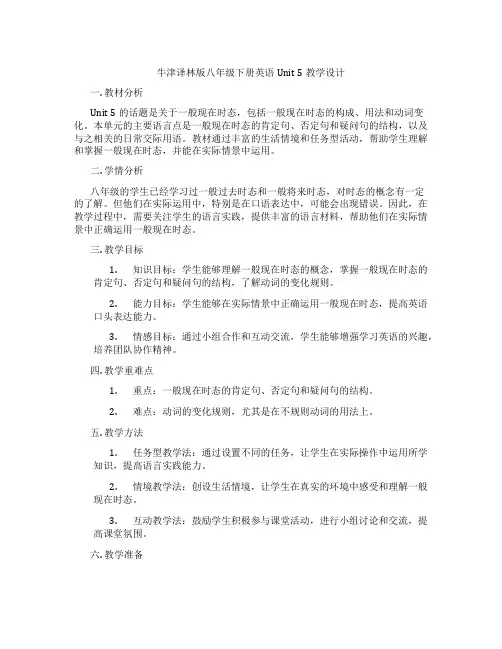
牛津译林版八年级下册英语Unit 5教学设计一. 教材分析Unit 5的话题是关于一般现在时态,包括一般现在时态的构成、用法和动词变化。
本单元的主要语言点是一般现在时态的肯定句、否定句和疑问句的结构,以及与之相关的日常交际用语。
教材通过丰富的生活情境和任务型活动,帮助学生理解和掌握一般现在时态,并能在实际情景中运用。
二. 学情分析八年级的学生已经学习过一般过去时态和一般将来时态,对时态的概念有一定的了解。
但他们在实际运用中,特别是在口语表达中,可能会出现错误。
因此,在教学过程中,需要关注学生的语言实践,提供丰富的语言材料,帮助他们在实际情景中正确运用一般现在时态。
三. 教学目标1.知识目标:学生能够理解一般现在时态的概念,掌握一般现在时态的肯定句、否定句和疑问句的结构,了解动词的变化规则。
2.能力目标:学生能够在实际情景中正确运用一般现在时态,提高英语口头表达能力。
3.情感目标:通过小组合作和互动交流,学生能够增强学习英语的兴趣,培养团队协作精神。
四. 教学重难点1.重点:一般现在时态的肯定句、否定句和疑问句的结构。
2.难点:动词的变化规则,尤其是在不规则动词的用法上。
五. 教学方法1.任务型教学法:通过设置不同的任务,让学生在实际操作中运用所学知识,提高语言实践能力。
2.情境教学法:创设生活情境,让学生在真实的环境中感受和理解一般现在时态。
3.互动教学法:鼓励学生积极参与课堂活动,进行小组讨论和交流,提高课堂氛围。
六. 教学准备1.教学课件:制作课件,展示一般现在时态的肯定句、否定句和疑问句的结构,以及动词变化规则。
2.教学素材:准备与教材相关的生活情境图片、视频等,用于展示和练习。
3.练习题:设计一些练习题,用于巩固所学知识。
七. 教学过程1.导入(5分钟)通过提问方式引导学生回顾已知的一般过去时态和一般将来时态,为新课的学习做好铺垫。
2.呈现(10分钟)利用课件展示一般现在时态的肯定句、否定句和疑问句的结构,以及动词变化规则。
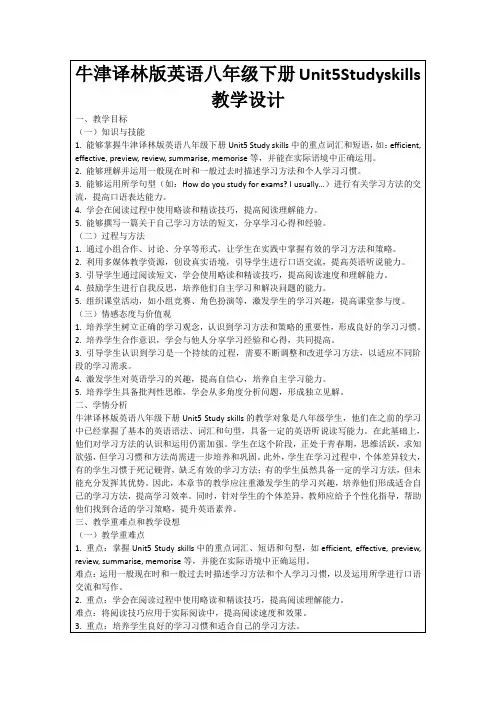
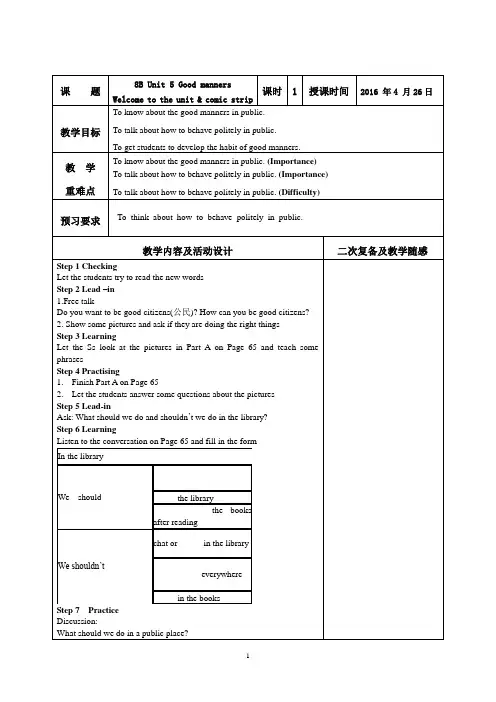
课题8B Unit 5 Good mannersWelcome to the unit & comic strip课时 1 授课时间2016 年4 月26日教学目标To know about the good manners in public.To talk about how to behave politely in public.To get students to develop the habit of good manners.教学重难点To know about the good manners in public. (Importance) To talk about how to behave politely in public. (Importance)To talk about how to behave politely in public. (Difficulty)预习要求To think about how to behave politely in public.教学内容及活动设计二次复备及教学随感Step 1 CheckingLet the students try to read the new wordsStep 2 Lead –in1.Free talkDo you want to be good citizens(公民)? How can you be good citizens?2. Show some pictures and ask if they are doing the right thingsStep 3 LearningLet the Ss look at the pictures in Part A on Page 65 and teach somephrasesStep 4 Practising1.Finish Part A on Page 652.Let the students answer some questions about the picturesStep 5 Lead-inAsk: What should we do and shouldn‟t we do in the library?Step 6 LearningListen to the conversation on Page 65 and fill in the formIn the libraryWe should ______ ___________ the library ______ _____ _____ the books after readingWe shouldn‟t chat or _____ in the library _____ _____ everywhere _____ in the booksStep 7 PracticeDiscussion:What should we do in a public place?We should….What shouldn‟t we do in a public place?We shouldn‟t….Step 8 Lead-inAsk: Do you think Hobo will share his things with others? What about Eddie?Step 9 Learning1.Read and answer the following questions.(1). Do you think Eddie really wants to teach Hobo?(2). What does Eddie teach Hobo?(3). What does Eddie really want from Hobo?nguage pointsStep 10 PracticeRead the conversation aloudStep 11 TestingTranslate some phrasesStep 12 Homework1.记忆词汇、词组和句型。
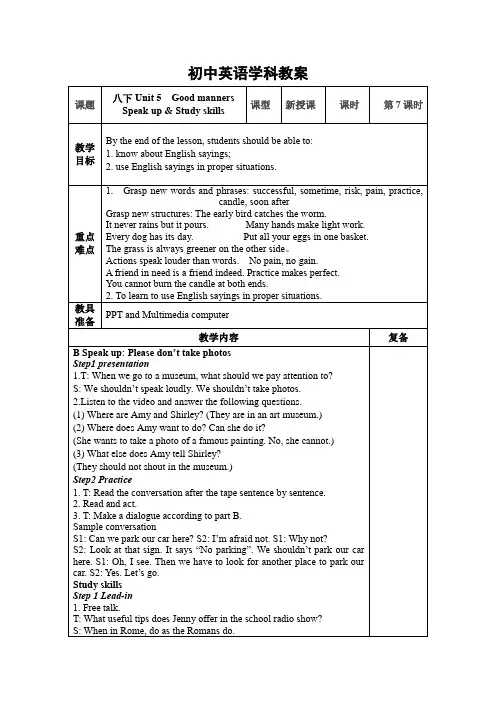
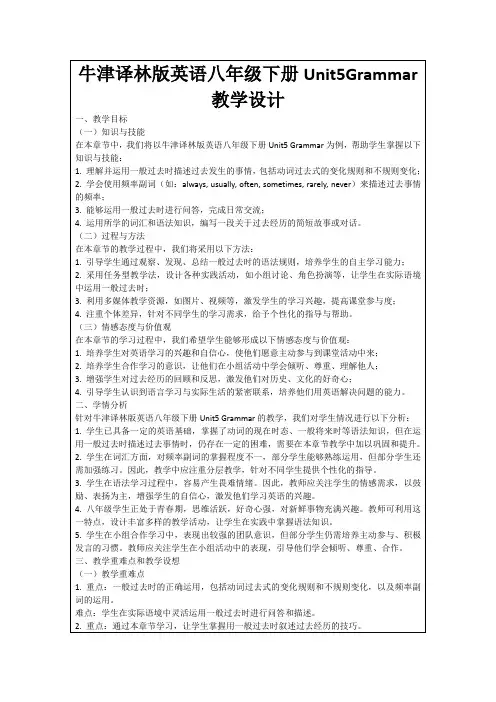
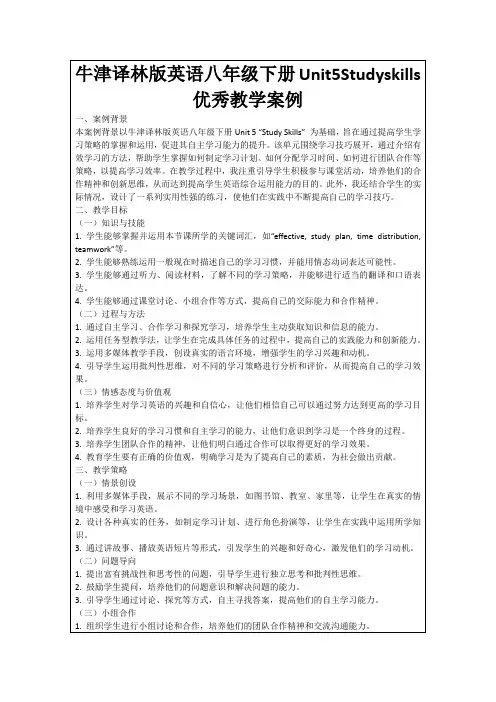
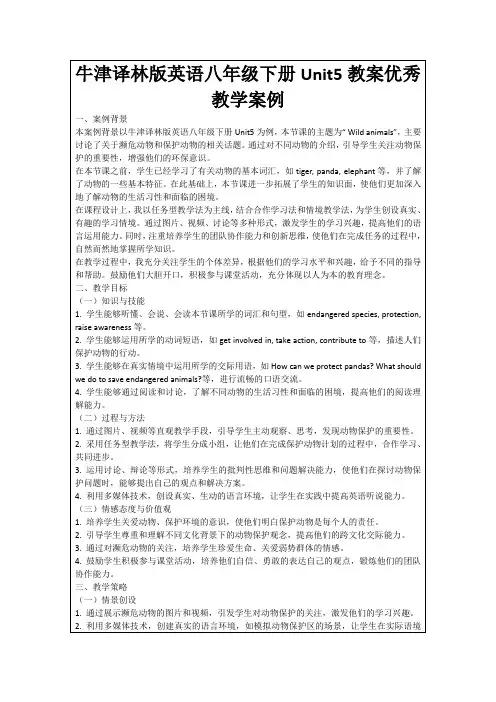
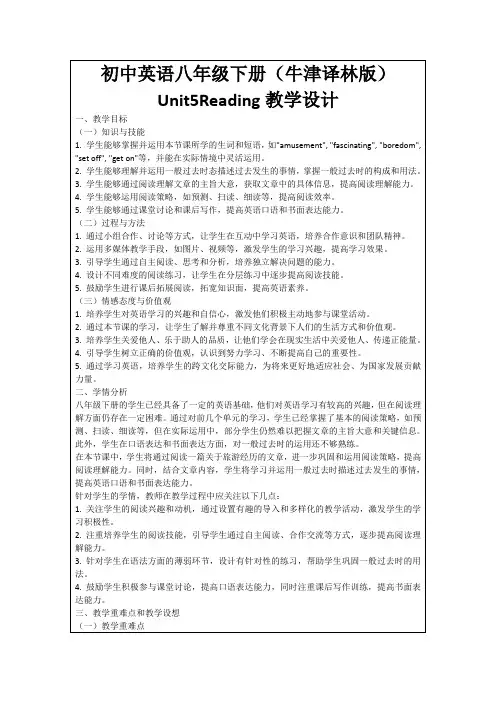

八下牛津译林英语全册教案一、教学内容本节课为人教版八年级下册牛津译林英语第五单元。
本单元主题是关于科学探索的过程和方法。
本节课的主要内容包括:1. 学习科学探究的步骤;2. 学习如何提出假设和制定计划;3. 学习如何进行实验和收集证据;4. 学习如何分析和解释结果;5. 学习如何与他人合作和交流。
二、教学目标1. 学生能够掌握科学探究的基本步骤和方法。
2. 学生能够提出假设,制定计划,进行实验,收集证据,分析和解释结果。
3. 学生能够与他人合作,进行有效的交流。
三、教学难点与重点重点:科学探究的基本步骤和方法。
难点:如何提出假设,制定计划,进行实验,收集证据,分析和解释结果。
四、教具与学具准备教具:多媒体课件,实验器材。
学具:笔记本,实验记录表。
五、教学过程1. 引入:通过一个简单的科学实验,引发学生对科学探究的兴趣。
2. 学习科学探究的步骤:引导学生学习科学探究的基本步骤,包括提出问题,做出假设,制定计划,进行实验,收集证据,分析和解释结果,与他人合作和交流。
3. 实践操作:学生分组进行实验,按照实验计划进行操作,收集证据,并记录实验结果。
4. 分析和解释结果:学生根据实验结果,进行分析,解释实验现象。
5. 交流和合作:学生分组进行交流,分享实验结果,讨论实验过程中的问题和困难。
六、板书设计科学探究的步骤:1. 提出问题2. 做出假设3. 制定计划4. 进行实验5. 收集证据6. 分析和解释结果7. 与他人合作和交流七、作业设计1. 根据本节课的内容,设计一份实验计划,包括实验步骤,实验材料和实验方法。
八、课后反思及拓展延伸1. 对本节课的教学效果进行反思,找出优点和不足,为下一节课的教学做好准备。
2. 引导学生进行拓展延伸,思考如何将科学探究的方法应用到其他学科和生活中。
重点和难点解析一、教学难点与重点重点:科学探究的基本步骤和方法。
难点:如何提出假设,制定计划,进行实验,收集证据,分析和解释结果。
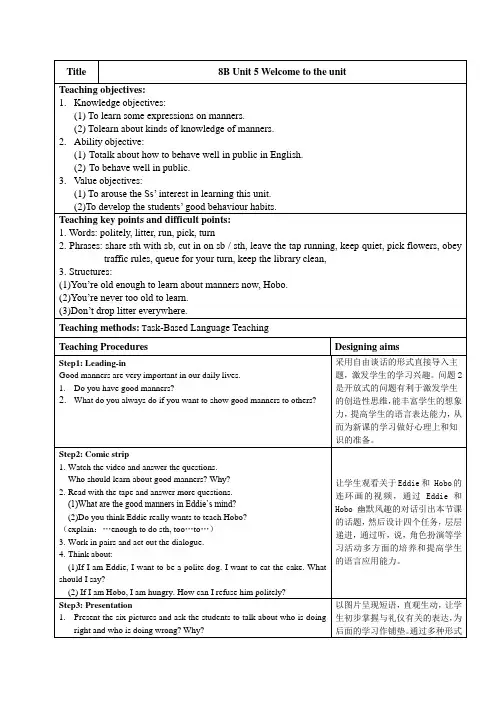
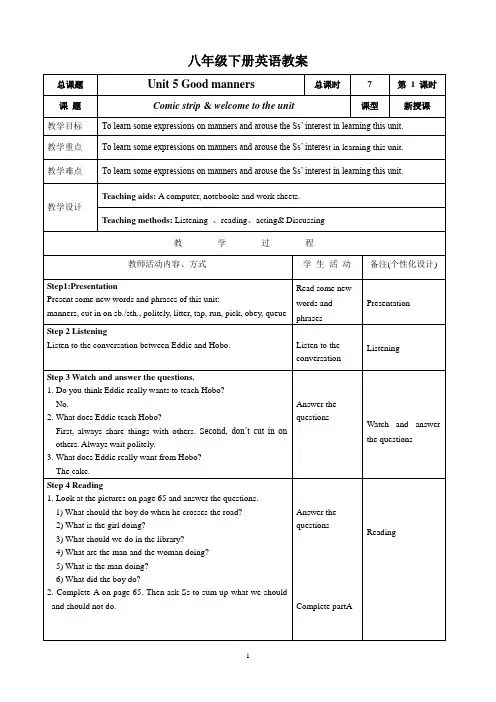
八年级下册英语教案Step 5 Listen to B on page 65 and complete the form.Listen to the conversation between Amy and Shirley, then complete the form. Listen to theconversationcomplete theform.Listen to B on page65 and complete theform.Step 6 Pair workGive some picture.Work in pairs and discuss what we should and should not do in a public place. Use the conversation as a model. discuss whatshould andshould not do ina public placePair workStep 7 Language points1. You’re o ld enough to learn about manners now.现在够大了可以学礼仪了。
sb.+ be +adj.+ enough to do sth.某人足够……做某事e.g. Tom is strong enough to lift the box.She is rich enough to buy this car.2. You’re never too old to learn. 活到老,学到老。
3. drop litter everywhere 到处扔垃圾4. leave the tap running 没关水龙头leave v. 让……处于(某种状态)e.g. Don’t leave the tap running.不要让水龙头一直开着。
5. queue for your turn 排队等侯turn n. 轮流, (轮流)的顺序e.g. Please wait your turn. 请等着轮到你。
Unit5 Reading2教案年级八年级科目英语课题8B Unit5 Reading(2) 课时 1 课型new 授课时间主备人交流时间整合时间组长签字教学目标1 To learn more details about the important manners in the UK.2 To master the language points and use them in daily life.重点To master the language points and use them in daily life.难点To cultivate polite behavior of students.教学准备Multimedia;教学设计详案二次备课内容Step 1 Free talkAsk and answer about good manners in the UK.1. What’s the proper way to greet people in t he UK?2. How do people start a conversation?3. How do people behave politely in public?4. Are British people polite at home?5. How do people be polite at home?Step 2 PracticePractice reading the followingthe proper way to greet peoplefor the first timeshake one’s handbehave politelyin publicpush inBump intoAnyth ing elsein one’s wayexcuse meas well (as)Keep your voice downLaugh loudlyby accidentStep 3 ReadingPractice reading the text in groups.阅读课文展示。
原句意为:为什么不要?why not意为“为什么不”,其后跟动词原形,这个句型还可以变成:Why don't you do sth.?表示“劝说、建议某人去做某事”。
如:Your spoken English is poor. Why not join an English club?你的英语口语很差。
为什么不参加一个英语俱乐部呢?Why not come early?=Why don't you come early?你为什么不早点来?常见的征求建议的句型还有:What/How about+名/词代词/v. -ing?……怎么样?如:What/How about going for a walk?去散步好吗?Shall we do...?我们做……好吗?如:Shall we play football?我们去踢足球好吗?Let's do…让我们做……吧。
如:Let's have a rest.让我们休息一会儿吧。
Would you like ( to do)...?你想(做)……吗?如:Would you like some bread?你想要些面包吗?3. These rules are important because we should make sure that both guests and hosts are comfortable at the table. (P77)原句意为:这些规则很重要,因为我们应该确保坐在桌子边的客人和主人都轻松自在。
句中的make sure意为“弄清楚;务必;确信”,其后多接that引导的宾语从句,有时也与of/about连用。
如:I make sure that I have turned the tap off.我确信我已关上了水龙头。
Please make sure of the time and place.请弄清楚时间和地点。
徐州市教学改革实验学校教师备课设计页课题8下Unit 5 Good manners Task 课型writing教具Recorder and multimedia 总课时数44 完成时间4.29教学方法Task-based approach 主备人Zhang Xizhi 授课时间5.6教学目标知识与能力:1.To make an outline to organize ideas2.To know how to write an article with the outline过程与方法:1.to get the Ss to talk about table manners in China in groups.2.help the Ss to know more about good table manners.情感态度与价值观:To train the Ss to respect others and have good table manners.教学重点难点1.To make an outline toorganize ideas2.To know how to writean article with theoutline教学活动内容活动组织过程改笔【前置学习】1、回顾复习:bad manners of people2、自学教材P76-773、自学检测:Check out the prepared work..【自主探究】Step 1 Present the learning targetsStep 2 Free talkLook at these people. They’re having dinner.Do they behave well or not ? Please say something about what they’re doing·Today we’ll learn about some good table manners.Step 3 Presentation1.The Class 1,Grade 8 students are going to give a talk on good table manners. They’re making a plan for the talk(1) What is the name of the talk? (Good table manners.)(2)Why is it held? ( The purpose of the talk is to teach students rules for eating.)(3) When and where will it take place?( It will take place at10 a.m. on 12 May at the school hall.)(4) What will We learn from the talk? Can you give some examples?(We will learn what we should do and should not do at the table….)1.write down the difficult phrases like “make too much noise、reach over someone’s plate for sth”on the blackboardStep 4 Practice1.Finish Part B with the information in the outline,and check the answers.2. Discuss the structures of the article in Part B, and fill in the table.Main idea Useful expressionsParagraph 1 PurposeParagraph 2 Time and placeParagraph 3 ContentParagraph 4 ConclusionStep 5 Writingwrite a passage about good table manners on a web page, and present the good articles to other students(Sample writing)We will have a talk on good manners in the library. The purpose of the talk is to teach students about basic rules in the library.It will take place at 3 p.m. next Friday at the school hall.There will be a lot of examples of what is right and wrong. You should always keep quiet in the library. You should not eat or drinking anything in the library.When you borrow a book from the library, you should wait in line for your turn. When you leave the library, remember to put the chair under the desk. Also, do nor forget to return your book on time. These rules are important because they will help everyone in the library feel comfortable.【课堂小结】1.purpose of the talk2.make too much noise3.reach over someone’s plate for sth4.above all5.The purpose of the talk is to teach students for eating.6.It will take place at 10 a.m. on 12 May at the school hall.【巩固拓展】1.如果你运动前不做准备活动,你就有受伤的危险。
课题8B Unit 5 Good mannersWelcome to the unit & comic strip课时 1 授课时间2016 年4 月26日教学目标To know about the good manners in public.To talk about how to behave politely in public.To get students to develop the habit of good manners.教学重难点To know about the good manners in public. (Importance) To talk about how to behave politely in public. (Importance)To talk about how to behave politely in public. (Difficulty)预习要求To think about how to behave politely in public.教学内容及活动设计二次复备及教学随感Step 1 CheckingLet the students try to read the new wordsStep 2 Lead –in1.Free talkDo you want to be good citizens(公民)? How can you be good citizens?2. Show some pictures and ask if they are doing the right thingsStep 3 LearningLet the Ss look at the pictures in Part A on Page 65 and teach somephrasesStep 4 Practising1.Finish Part A on Page 652.Let the students answer some questions about the picturesStep 5 Lead-inAsk: What should we do and shouldn’t we do in the library?Step 6 LearningListen to the conversation on Page 65 and fill in the formIn the libraryWe should ______ ___________ the library ______ _____ _____ the books after readingWe shouldn’t chat or _____ in the library _____ _____ everywhere _____ in the booksStep 7 PracticeDiscussion:What should we do in a public place?We should….What shouldn’t we do in a public place?We shouldn’t….Step 8 Lead-inAsk: Do you think Hobo will share his things with others? What about Eddie?Step 9 Learning1.Read and answer the following questions.(1). Do you think Eddie really wants to teach Hobo?(2). What does Eddie teach Hobo?(3). What does Eddie really want from Hobo?nguage pointsStep 10 PracticeRead the conversation aloudStep 11 TestingTranslate some phrasesStep 12 Homework1.记忆词汇、词组和句型。
2.背诵Comic strip 和B部分的对话。
3. 预习Reading教学反思教研组长审核意见:课题8B Unit 5 Good mannersReading 1课时 1 授课时间2016 年4 月27日教学目标To know about some good manners in the UK. To grasp the main idea of the conversation.To lead students to behave politely in public.教学重难点To know about some good manners in the UK. (importance)To finish some exercises according the conversation. (importance) To grasp the main idea of the conversation. (difficulty)预习要求To search the Internet for the good manners in the UK.教学内容及活动设计二次复备及教学随感Step1 CheckingTranslate them into English:1. 随处扔垃圾2. 打断他人3. 在图书馆保持安静4. 在公园摘花5. 遵守交通规则6. 排队等候你的顺序7.(你)活到老学到老。
8. 你现在年龄已大到学习有关礼仪方面的知识了。
9. 你不应该任水龙头流水。
10. 恐怕不是。
Step2 Lead—inHave a free talk:What do you usually do when you greet people ?Doyou start a conversation with weather when you talk with others ?What will you do if someone is in your way ?Step3 Learning1. Learn some new words and complete Part B1.2.SkimmingRead the article quickly and answer the questions.What is the conversation about?Who is Daniel talking to?3. ScanningRead the dialogue carefully and answer some more questions.1). What is the proper way to greet people in the UK?2).Who do they greet with a kiss?3).How do British people start a conversation?4).Do they talk about age?5).How do they behave in public?6). Are British people polite at home?7).What else should we pay attention to in public?Step4 PracticeFind the detailed information and finish the table.Read the passage again and complete PartsB2.3Talk about the questions in Part C.Step5Test完成课课练47页T一、二。
Step6 HomeworkFinish off the exercises in the Exercise Book . Try to remember the manners in the UK.教学反思教研组长审核意见:课题8B Unit 5 Good mannersReading 2课时 1 授课时间2016 年4 月28日教学目标To grasp the main idea of the conversation further and better.To grasp the important vocabulary and sentences in the conversation. To finish some exercises to grasp these language points further.教学重难点To grasp the important vocabulary and sentences in the conversation (Importance) To finish some exercises to grasp these language points further. (Difficulty)预习要求To revise the conversation in Reading.教学内容及活动设计二次复备及教学随感Step1 CheckingRead the dialogue and answer some questions:What’s the proper way to greet people in the UK?How do people start a conversation in the UK? Do they behave politely inpublic?British people are very polite at home as well, aren’t they?Step2 Lead—inWe have got some information about manners in the UK, but I have someproblems in translating.Do you want to help me?Step3 LearningLearn language points:1. What’s the proper way to greet people th ere, Jenny?proper adj. 符合习俗的;正确的greet sb. with sth.以…方式跟人打招呼2. British pe ople say “hello” or “nice to meet you” and shake your handwhen they meet you for the first time.shake sb’s hand 与某人握手3. But please avoid subjects like age, weight or money.avoid vt,避免后面直接跟宾语。